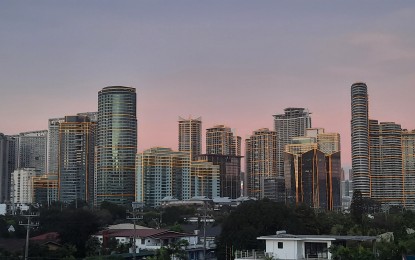
(File photo)
MANILA – The Inter-Agency Task Force for the Management of Emerging Infectious Diseases (IATF-EID) has adopted the 10-point policy agenda for the country’s economic recovery from the impact of the coronavirus disease 2019 (Covid-19) pandemic, Malacañang said Wednesday.
The 10-point policy agenda, which was adopted by the IATF-EID on Tuesday, must be followed by all government departments and offices, acting Presidential Spokesperson, Communication Secretary Martin Andanar, said in a press statement.
“The Inter-Agency Task Force on Tuesday, April 12, 2022, adopted the 10-Point Policy Agenda for economic recovery and directed all government agencies to ensure all related policies, measures, and programs are aligned with the 10-Point Policy Agenda,” Andanar said.
The policy agenda was adopted under President Rodrigo Duterte’s Executive Order (EO) 166 inked on March 21 this year.
Under EO 166, the adoption of the 10-point policy agenda will help fast-track economic recovery and drive broad-based expansions across various productive sectors, amid the pandemic.
Andanar said local government units are enjoined to adopt the same policies, measures, and programs to hasten the recovery of the Philippine economy.
The National Economic and Development Authority (NEDA), he said, must ensure the government agencies' implementation of the 10-point policy agenda on economic recovery.
Andanar said the NEDA is also mandated to periodically report the compliance of state departments and offices to the President, through the Office of the Executive Secretary.
EO 166 seeks to sustain current economic gains, minimize the pandemic’s long-term adverse effects, and restore the country’s development trajectory.
The EO adopted by the IATF-EID directs the government offices to strengthen health care capacity; accelerate and expand the vaccination program; further reopen the economy and expand public transport capacity; resume face-to-face learning; reduce restrictions on domestic travel and standardize local government units’ requirements; and relax requirements for international travel.
It also mandates the national government to accelerate digital transformation through legislative measures; provide for enhanced and flexible emergency measures through legislation; shift the focus of decision-making and government reporting to more useful and empowering metrics; and undertake medium-term preparation for pandemic resilience.
Malacañang earlier expressed optimism that EO 166 would also be implemented by the succeeding administrations.
Continued reporting of Covid-19 cases
Andanar said workplaces should continue reporting Covid-19 cases to their respective Local Epidemiology and Surveillance Units, pending the completion of the pilot implementation of the sentinel surveillance systems.
The IATF-EID issued the latest directive upon the recommendations of the Sub-Technical Working Group on Data Analytics.
Under IATF-EID Resolution 166 issued Tuesday, guidelines for the system will be provided, once the Covid-19 surveillance has fully transitioned to sentinel surveillance. (PNA)
